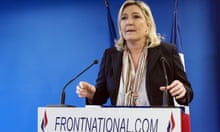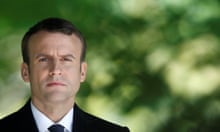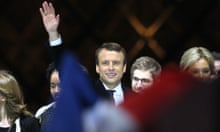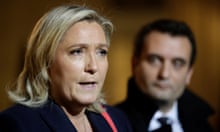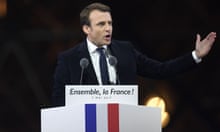In her apartment in a northern suburb of Paris, Hanane Charrihi looked at a photograph of her mother Fatima. “Her death shows that we need tolerance more than ever,” she said. “Tolerance does exist in France, but sometimes it seems those who are against tolerance shout the loudest and get the most airtime.”
Fatima Charrihi, 59, a Muslim grandmother, was the first of 86 people to be killed in a terrorist attack in Nice last summer when a lorry driver ploughed into crowds watching Bastille Day fireworks. She had left her apartment and gone down to the seafront to have an ice-cream with her grandchildren. Wearing a hijab, she was the first person the driver hit in the gruesome attack claimed by Islamic State. A third of those killed in the Nice attack were Muslims. But Fatima Charrihi’s family, some wearing headscarves, were insulted by passersby who called them “terrorists” even as they crouched next to their mother’s body under a sheet at the site of the attack. “We don’t want people like you here any more,” a man outside a cafe told her family soon after the attack.
Hanane Charrihi, 27, a pharmacist, was so irked to find that, even after her mother’s death, the so-called “problem” of Islam in France was such a focus of political debate that she wrote a book, Ma mère patrie, a plea for living together harmoniously in diversity. The far-right Front National gained a slew of new members in Nice after the attack and now Marine Le Pen’s presence in the final presidential runoff this weekend – after taking a record 7.6 million votes in the first round – has pushed the issue of Islam and national identity to the top of the agenda.
“I’m French, I love my country, and it seemed like people were saying to me: ‘No, you can’t possibly love France,’” Hanane Charrihi said. “All this focus on debating national identity by politicians seems like wasting time that could be focused instead on unemployment, work or housing.”
The runoff between the far-right, anti-immigration Le Pen and the independent centrist Emmanuel Macron has seen heated exchanges over Islam and national identity. In 2015, Le Pen was tried and cleared of inciting religious hatred after comparing Muslims praying in the streets to the Nazi occupation. Macron has insisted that Le Pen still represents “the party of hatred”. He told a Paris rally this week: “I won’t accept people being insulted just because they believe in Islam.” After more than 230 people were killed in terrorist attacks in France in just over two years, Le Pen has called Islamic fundamentalism a “mortal danger” for France and accused Macron of having an “indulgent attitude” towards it. He accused her of dividing France and stoking “civil war”.
Le Pen’s policy proposals include banning religious symbols, such as the Muslim headscarf, from all public places. She would outlaw ritual animal slaughter, namely Islamic halal slaughter, although Jewish kosher practices would also be affected.
When Le Pen’s father and her party’s co-founder, Jean-Marie Le Pen, reached the final round of the presidential election in 2002, the political class spontaneously united with anti-racism campaigners to block his vote, marching on the streets. This time anti-Le Pen demonstrations have been fewer, smaller and more fragmented. Comparatively few people have lined up behind anti-racism banners, and the Front National is now accepted as a part of the political landscape. The issue of diversity and France’s divisions – between city and countryside, rich and poor, so-called “native” French and immigrants – have haunted the campaign.
In Aubervilliers market – part of Seine-Saint-Denis, the leftwing and ethnically diverse area north-east of Paris, where young people on estates complain of discrimination that has underlined youth unemployment – Ezzedine Fahem, 62, worried there was a growing divide. “In some places Le Pen’s vote is increasing, yet here the very idea of Le Pen sparks fear,” said the former restaurant worker. “To me, it feels like she targets Muslims, religion, foreigners. All this talk of integration. Look around here – everyone from abroad was pushed here into a ghetto. Now even if you’re French and born here, you will always be brought back to your roots. You’re French but you’re always an Arab, you’re still black, you’re still Jewish.”
At the market, Alexandre Aidara is handing out election leaflets for Macron. He is one of the few parliamentary candidates already selected to run for parliament in June for Macron’s “neither left nor right” movement, En Marche! (On the Move). Aidara, 49, an engineer who was born in Senegal and studied in France, including at the elite civil service school, École Nationale d’Administration, has worked at a senior level in top government ministries. He said Macron’s choice of more parliamentary candidates from ethnic minorities was a bid to renew the political class. Although Seine-Saint-Denis is one of the most ethnically diverse areas in France, only one of its 13 MPs is not white. Of France’s 577 members of parliament, four come from ethnic minorities.
Le Pen’s stance on the high-rise banlieues surrounding French cities is that security must come first. Macron’s take is that discrimination is a growing problem and business opportunities hold the key. He has said that he wants “social mobility” and would give a €15,000 bonus over three years to companies who hired people from 200 designated poor neighbourhoods.
“On diversity issues, Emmanuel Macron wants to show there are role models,” Aidara said. “The role models here are rappers and footballers. That’s good – art and culture is great. But you can also succeed through school, like me, through being an engineer. Discrimination represents a big economic loss to the economy and the state.”
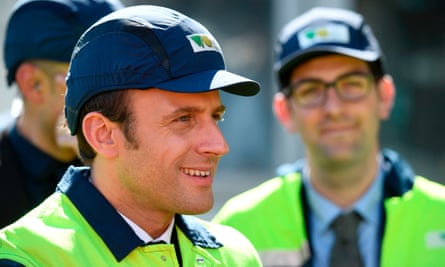
Macron has argued that his line on fighting terrorism is to look at the “roots” of why French-born children are growing up to take arms against their own country – a view that has sparked scorn not just from Le Pen but from Socialists. “When people are born in France and attack France, it means integration has failed – you have to look at that, have to work on jobs, education, integration and schools. That’s why we want to cut class sizes in priority zones,” Aidara said.
Who are Macron and Le Pen and what do they stand for?
• Emmanuel Macron and Marine Le Pen are the two candidates in the French presidential election runoff on Sunday 7 May.
• Macron, 39, is the head of the En Marche! (Forward) movement. He defines himself as an outsider, 'of the left' and progressive on social issues, but economically liberal and pro-business. The former investment banker, who served as a Socialist economy minister, also wants closer cooperation on European issues.
• Le Pen, 48, is the candidate of the far-right Front National party. A lawyer by training, she has attempted to detoxify the party. She wants to clamp down on immigration, slash crime, eradicate Islamism, and pull France out of Europe. Le Pen is in favour of 'economic nationalism' and social policies that favour French people.
Macron also tried to take on the unresolved chapter in French history that is the colonial period and war in Algeria. On a visit to Algiers in February, he called France’s colonial past a “crime against humanity”. He later tempered his comments, but insisted: “We must face this common, complex past if we want to move on and get along.” Le Pen this week accused him of slandering France’s “glorious history”.
Sara, 22, took a leaflet for Macron. A first-time voter and technology student who wears a Muslim headscarf, she voted in the first round for the hard-left Jean-Luc Mélenchon, “because he was about everyone in France living together and getting on”. She felt anti-Islam feeling was becoming “almost commonplace” in France. “I’m not sure Emmanuel Macron has really understood that,” she added, but she would vote for him to keep Le Pen out. She liked the fact that Macron did not want to ban the Muslim headscarf from universities – an idea proposed by some on the mainstream right and even backed by the former Socialist prime minister Manuel Valls.
For years the French principle of secularism, or laïcité, has been caught up in a row over whether it has been twisted for political gain. The French republic is built on a strict separation of church and state, intended to foster equality for all private beliefs. But controversies – such as mayors banning the burkini full-body Muslim swimsuit from French beaches last summer – have seen commentators, and even the courts, warn of the “violation of fundamental freedoms” in singling out Muslims. Macron has said his approach to French secularism would be “tolerant”, sparking accusations from Le Pen that he is “lax”.
“Racism, racism, racism – that’s what I’m afraid of in France,” said a 49-year-old French town hall worker who was born in Tunisia. “I didn’t vote in the first round but on Sunday I’m going to drag everyone I know out of their beds and drag them to vote Macron. I wouldn’t normally vote for Macron, but what choice do we have? This election isn’t over yet. The result is open. I worry Le Pen could win, and if she does, I think I might just leave France until her time in power is over.”



